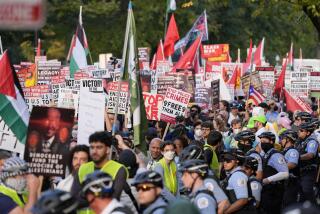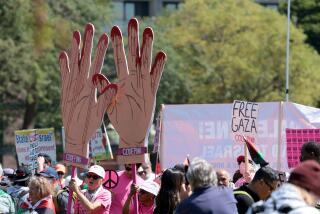âInspections, Not Warâ: 2,500 Rally in Washington
WASHINGTON â Claiming that President Bush is more interested in grabbing Saddam Husseinâs oil resources than his weapons of mass destruction, several thousand demonstrators marched through the nationâs capital Sunday to protest a potential attack on Iraq.
âThe message is: No war in Iraq. We need inspections, not war; disarmament, not overthrow of the Iraqi regime,â said Phyllis Bennis of the Institute for Policy Studies, a Washington public-policy group.
A strike against Iraq âwill bring on more terrorism, the deaths of who knows how many Americans and the deaths of hundreds of thousands of Iraqi citizens,â said Al Fischman, 74, a retiree from Michigan.
âIt will accomplish absolutely nothing.â
The protest came as U.S. lawmakers continued their debate over how much latitude to give Bush in pursuing military action against Iraq, and as U.N. weapon inspectors prepared to meet with Iraqi officials today to lay down demands for their return.
The march, which was peaceful, took demonstrators up Washingtonâs Embassy Row. It paused briefly at the embassies of countries on the U.N. Security Council, a symbolic plea for them to guide the United States away from war, and ended with a rally outside the residence of Vice President Dick Cheney.
âNo blood for oil,â the protesters yelled. âOne, two, three, four, we donât want your oil war.â
Police estimated that about 2,500 people participated.
The protest marked the third day of demonstrations in Washington against U.S. foreign policy, coinciding with annual meetings of the International Monetary Fund and the World Bank.
Protesters blame the two international finance agencies for setting out loan terms for indigent nations that harm the poor and the environment.
Authorities had prepared for as many as 20,000 protesters over the weekend, but far fewer appeared.
On Sunday, the protesters included church groups, suburban families and college students--a more diverse crowd than had appeared at rowdier demonstrations on Friday and Saturday.
Those had been dominated by college-age protesters.
âOrdinary folks are opposing the war, not just the rabble-rousing kids,â said Dave Bort, a 51-year-old electrical engineer from Maryland who wore a three-piece suit.
âThereâs a lot of strong opposition in the suburban neighborhoods to any more killing,â said Mike Hanna, 38, an environmental engineer who turned out with fellow parishioners from his Roman Catholic church in Virginia. They included a lawyer, an occupational therapist and a college professor.
âThereâs been enough killing in the past year. Killing a bunch of Iraqis wonât help anything.â
Ryan Amundson of Hartville, Mo., said he was attending on behalf of 50 people who lost relatives in the Sept. 11 terrorist attacks. âItâs very upsetting to see Sept. 11 used to justify this war with Iraq,â said Amundson, whose brother, Craig, 27, died at the Pentagon, where he was working as a multimedia illustrator for the Army.
âWe know many innocent people will die in a war, and we think that will bring more insecurity than peace. We donât want anyone, anywhere, to have to go through what we went through.â
Many of the protesters said they feared that Bush was using Iraqâs suspected weapon programs as an excuse to gain control of Iraqi oil, or to avenge a suspected 1993 assassination plot against former President Bush, the current presidentâs father.
They also said the president had made the world less secure by asserting, in a new foreign policy doctrine, that the United States may strike first against hostile states developing weapons of mass destruction.
âIf weâve been attacked, then we should defend ourselves,â said Medea Benjamin of the group Global Exchange, which helped organize the protest.
âBut we canât have a world run by preemptive strikes. That would indeed be a world of perpetual war.â
*
Times staff writer Aaron Zitner contributed to this report.
More to Read
Sign up for Essential California
The most important California stories and recommendations in your inbox every morning.
You may occasionally receive promotional content from the Los Angeles Times.










